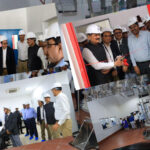Vitamin-C tablets market in India should be seen through the patient lens. There has been a steep rise in the cost of raw materials used to manufacture this immunity boosting medicine. There is a dire need of policy intervention, where imposing anti-dumping duty is not a solution.


India set the agenda of self-reliance in the pharma sector by declaring 2015 as the “Year of APIs”. Since then, the country has been trying to reduce external dependence for its Active Pharmaceutical Ingredients (APIs)requirement. In 2019, India still imported 68% of its APIs from outside the country, mostly from China.1[1]What does this tell us? The contour of self-reliant India will take its time to unveil and we need to strengthen domestic manufacturing before “promising big”. Today, the manufacturing hubs in the pharmacy of the world that India is, are taking a hit. Take, for instance Vitamin C; there has been a steep rise in the cost of raw materials used to manufacture this immunity boosting medicine.
Digging deeper into India’s story of Vitamin-C tablets
The Vitamin-C supplement is available under two categories— as an essential medicine and a food supplement. Hence, the difference in the prices of brands available in the market. Let’s understand this with an example. Take, for instance, the much-in-demand Limcee and Celin; these are medicines that are recognized as essential medicines, therefore classified under National List of Essential Medicines (NLEM) under price control. They fall under the purview of Drugs Controller General of India (DGCI) and the National Pharmaceuticals Pricing Authority. Currently, the price of Limcee stands at Rs.1.67 per tablet.
The other side of the coin are the Vitamin C supplements that fall under the purview of Food Safety and Standards Authority of India (FSSAI), where the drug is treated like a supplement and the manufacturers enjoy the liberty of unregulated pricing and can freely increase their prices. Many new companies have also launched their brands in the last few months as food supplements, given the increased demand during the current pandemic, and these are priced multiple times that of the NLEM brands (up to Rs.12.25 per tablet in some cases).
Now this move has impacted the cost of production of Vitamin C produced by pharmaceuticals companies in India. With the result, the companies under the purview of FSSAI can possibly afford these raw materials and subsequently charge any amount of money they want from consumers because they are not subject to price control. On the other hand, the manufacturers of Vitamin C under price control are facing issues in producing abundant affordable medicines for the consumers because of this enhanced cost of raw materials by domestic suppliers.
To add to that, with the increase in demand, domestic companies are anyway not able to supply adequate amounts of the raw material. It must be noted that the manufacturers of low cost NLEM drugs are obligated under laws to make the drugs available to consumers unlike the manufacturers of food supplements. The pricing structure and inadequate supplies from the domestic raw material providers however, has hit the production capacity of companies manufacturing affordable versions.
With the result, the patients have little access to the more affordable medicines as companies are unable to cater to the demand because of inadequate supplies. The patients end up buying the costlier version of Vitamin C that comes under the purview of FSSAI. The next question is—if Make in India was about affordable solutions, why are the rising costs of these APIs not regulated? How is it fair to regulate the price of the end product, when raw material price hikes are at the discretion of the suppliers?


When the idea of a self-reliant India rests on the grounds of affordability and accessibility, why are the patients denied access to something as basic as a Vitamin C tablet? Importantly, the domestic industry has had 22 years to get its act together as that is when the anti-dumping law came into force. In today’s era of globalization, such a draconian law does not serve well for the country. A topic worth considering.
Cannot achieve patient interest without accessibility
For India to lead its people into a safe healthcare paradigm, we will have to create policies that foster accessibility and affordability. Make in India should not restrict our patients’ access to medicines that are otherwise available at affordable prices. The focus should be to address the issues that we have, instead of imposing restrictive policies.
Issues such as improving the healthcare infrastructure, building a strong primary healthcare system, having facilities to bring more doctors and healthcare workers into the system, investment into research and development, and digital health. These are the real issues to be addressed. The pandemic has exposed many realities of India’s pharmaceutical industry. From underlining the serious fault line in the global pharmaceutical supply chain, to revealing our increased costs of APIs, and inadequate supplies of reasonably priced medicines to patients.
Isn’t it counterproductive to the entire purpose of providing affordable healthcare to the people of India? Therefore, there is a dire need of policy intervention, where imposing anti-dumping duty is not a solution. It is more important to set things right internally first.


Dr. Gajendra Singh
Public Health Expert
[1]https://timesofindia.indiatimes.com/business/india-business/68-of-apis-comes-from-china-govt-data/articleshow/76521046.cms











